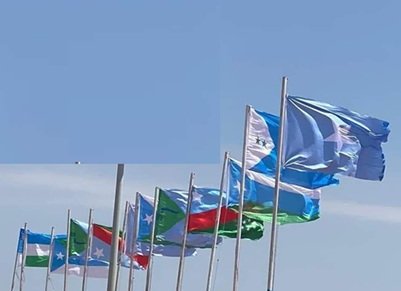
AFRICA
Written by Stylo News: AI-Powered, Multi-Source Global News

Images © their owners, publicly available, for informational purposes.
Map of Events
The events and discussions revolve around Somalia, particularly focusing on the federal member states such as Puntland, Jubbaland, and the broader Somali territories including Mogadishu and the Somali-Ethiopian border regions.
Locations
Event Updates
Rebuttal to Claims that Somali Federalism is an Ethiopian Imposition
Executive Summary
Ismail H. Warsame, a founding member of Puntland State and contributor to WardheerNews, published a detailed rebuttal to Mohamed Ali Mirreh's critique that Somali federalism is a colonial-style plot orchestrated by Ethiopia. Warsame argues that federalism in Somalia is an indigenous political solution developed by Somalis themselves as a response to the catastrophic failure of a centralized state, particularly after the collapse of the Somali government in 1991. He emphasizes that federalism was a strategic demand of opposition groups against dictatorship and a safeguard against future centralized oppression. The federal system was developed through Somali-led constitutional processes in Eldoret, Mbagathi, and Garowe without foreign imposition. Warsame also refutes claims of Ethiopian-engineered demographic shifts, attributing migration issues to weak central governance and poor border control. He highlights that resource exploitation problems stem from centralized corruption rather than federalism itself. Federal member states such as Puntland and Jubbaland are portrayed as vital providers of security and governance, not pseudo-states. Warsame concludes that federalism is the only viable framework for peaceful coexistence and national unity in Somalia, urging reform of Mogadishu's political elite rather than dismantling federalism.
Situation
The Somali political landscape has been marked by debates over the legitimacy and origins of federalism. Following the collapse of the centralized Somali state in 1991, various Somali factions sought ways to rebuild governance structures. Federalism emerged as a compromise to decentralize power and prevent dictatorship, with significant Somali agency in its design and implementation. Critics like Mohamed Ali Mirreh have argued that federalism is an Ethiopian imposition meant to weaken Somali unity. Warsame's rebuttal challenges this narrative by providing historical context, personal involvement, and analysis of Somali political dynamics. Key events include the constitutional conferences in Eldoret, Mbagathi, and Garowe, which were Somali-led initiatives. National responses are mixed, with federal member states advocating for local governance and the central government in Mogadishu often accused of monopolizing resources and power. Quotes from Warsame emphasize federalism as a bulwark against tyranny and a path to equitable Somali nationalism. The debate continues to influence Somalia's political stability and governance reforms.
International Impact
The discussion around Somali federalism touches on regional stability in the Horn of Africa. Ethiopia's role is often scrutinized, with some accusing it of interference, while others, like Warsame, deny such involvement. International actors monitoring Somalia's progress see federalism as a potential path to peace and stability if properly implemented. The debate influences foreign aid, diplomatic relations, and security cooperation in the region. Leaders from neighboring countries and international organizations emphasize the importance of Somali-led solutions to governance challenges. The rebuttal seeks to clarify misconceptions that could affect international perceptions and policies toward Somalia's federal system.
Decision Maker Perspectives
Somali Federal Member States (e.g., Puntland, Jubbaland): Advocate for local governance, security provision, and resource control, emphasizing their legitimacy and critical role in Somalia's stability.
Central Government of Somalia (Mogadishu): Accused of monopolizing resources and power, sometimes resisting decentralization efforts, and blamed for institutional weaknesses.
Ismail H. Warsame (Author and Puntland Founder): Argues federalism is a Somali-originated solution to prevent dictatorship and promote national unity, rejecting claims of Ethiopian imposition.
Mohamed Ali Mirreh (Critic of Federalism): Claims federalism is an Ethiopian-orchestrated plot undermining Somali unity and sovereignty.
Source Perspectives
WardheerNews: Provides a platform for diverse Somali opinions, publishing both critiques and rebuttals on federalism, maintaining a focus on Somali political discourse and analysis.